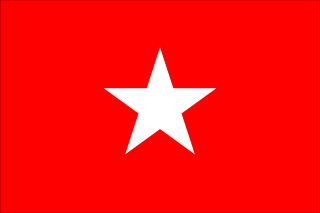Related Research Articles

The Partition of India in 1947 was the change of political borders and the division of other assets that accompanied the dissolution of the British Raj in the Indian subcontinent and the creation of two independent dominions in South Asia: India and Pakistan. The Dominion of India is today the Republic of India, and the Dominion of Pakistan—which at the time comprised two regions lying on either side of India—is now the Islamic Republic of Pakistan and the People's Republic of Bangladesh. The partition was outlined in the Indian Independence Act 1947. The change of political borders notably included the division of two provinces of British India, Bengal and Punjab. The majority Muslim districts in these provinces were awarded to Pakistan and the majority non-Muslim to India. The other assets that were divided included the British Indian Army, the Royal Indian Navy, the Royal Indian Air Force, the Indian Civil Service, the railways, and the central treasury. Provisions for self-governing independent Pakistan and India legally came into existence at midnight on 14 and 15 August 1947 respectively.

La Vía Campesina is an international farmers organization founded in 1993 in Mons, Belgium, formed by 182 organisations in 81 countries, and describing itself as "an international movement which coordinates peasant organizations of small and middle-scale producers, agricultural workers, rural women, and indigenous communities from Asia, Africa, America, and Europe".

Arain are a large Punjabi agricultural tribe with a strong political identity and level of organisation, found mainly in the Pakistani provinces of Punjab and Sindh with a small population in parts of Indian Punjab, Uttar Pradesh and Uttarakhand.

Khan Bahadur Captain Sir Sikandar Hayat Khan,, also written Sikandar Hyat-Khan or Sikandar Hyat Khan, was an Indian politician and statesman from the Punjab who served as the Premier of the Punjab, among other positions.

The Wali Khan faction of the National Awami Party was formed after the 1967 split in the original NAP between Maulana Bhashani and Abdul Wali Khan. The Wali Khan faction was later named National Awami Party (NAP) after the independence of Bangladesh.

India–Pakistan relations are the bilateral ties between the Republic of India and the Islamic Republic of Pakistan. The two countries have a complex and largely hostile relationship that is rooted in a multitude of historical and political events, most notably the partition of British India in August 1947. The India–Pakistan border is one of the most militarised international boundaries in the world. Northern India and most of modern-day Pakistan overlap with each other in terms of their common Indo-Aryan demographic, natively speaking a variety of Indo-Aryan languages.

The Sindhudesh Movement is a separatist movement seeking to create a homeland for Sindhis proposed by Sindhi nationalist parties for the creation of a Sindhi state, which would be either autonomous within Pakistan or independent from it. The movement is based in the Sindh region of Pakistan and was conceived by the Sindhi political leader G. M. Syed after the independence of Bangladesh. He gave a new direction to Sindhi nationalism, founded the Jeay Sindh Tehreek in 1972 and presented the idea of Sindhudesh. Sindhi nationalists sometimes claims the Kutch region of India, the Lasbela District of Balochistan, and sometimes southern Punjab
The Telangana Rebellion popularly known as Telangana Sayuda Poratam of 1946–51 was a communist-led insurrection of peasants against the princely state of Hyderabad in the region of Telangana that escalated out of agitations in 1944–46.

The Mazdoor Kisan Party is a communist party in Pakistan. It was founded on 1 May 1968 by Afzal Bangash and Sher Ali Bacha. Other prominent leaders included Ishaq Muhammad and Imtiaz Alam. In the 1970s, the MKP led a militant communist movement in Hashtnagar, Charsadda District, Khyber Pakhtunkhwa.
Racism in Zimbabwe was introduced during the colonial era in the 19th century, when emigrating white settlers began racially discriminating against the indigenous Africans living in the region. The colony of Southern Rhodesia and state of Rhodesia were both dominated by a white minority, which imposed racist policies in all spheres of public life. In the 1960s–70s, African national liberation groups waged an armed struggle against the white Rhodesian government, culminating in a peace accord that brought the ZANU–PF to power but which left much of the white settler population's economic authority intact.
Agrarian reform and land reform have been a recurring theme of enormous consequence in world history. They are often highly political and have been achieved in many countries.
The Jat people are a traditionally agricultural community in Northern India and Pakistan. Originally pastoralists in the lower Indus river-valley of Sindh, Jats migrated north into the Punjab region in late medieval times, and subsequently into the Delhi Territory, northeastern Rajputana, and the western Gangetic Plain in the 17th and 18th centuries. Of Hindu, Muslim and Sikh faiths, they are now found mostly in the Indian states of Punjab, Haryana, Uttar Pradesh and Rajasthan and the Pakistani provinces of Sindh and Punjab.
The Janjua is a Punjabi Rajput clan found predominantly in the Pothohar Plateau of Pakistani Punjab. They are sometimes classified as Jats.
Jamaat Ali Shah was a Sufi of the Naqshbandi order and an author. He was President of All India Sunni Conference and the leader of the Shaheed Ganj Mosque. He was an influential leader of the Pakistan Movement.
The credibility thesis is a proposed heterodox theoretical framework for understanding how societal institutions or social rules come about and evolve. It posits that institutions emerge from intentional institution-building but never in the originally intended form. Instead, institutional development is endogenous and spontaneously ordered and institutional persistence can be explained by their credibility, which is provided by the function that particular institutions serve rather than their theoretical or ideological form. The credibility thesis can be applied to explain, for example, why purported institutional improvements do not take hold as part of structural adjustment programs, while other economies in the developing world deliver growth despite absence of clear and strong market mechanisms such as indisputable private property rights or clearly delineated and registered land tenure. The thesis has been applied to explain the failure and success of institutional reforms for various sectors and property rights, including but not limited to, land, housing, informal housing and slums, natural resources, climate change policy and environmental policy.
Punjabi nationalism or Punjabiyat is a vision that emphasizes that Punjabis are one nation and promotes the cultural unity of Punjabis around the world. The demands of the Punjabi nationalist movement are linguistic, cultural, economic and political rights.
Aasim Sajjad Akhtar is a teacher, left wing politician and columnist based in Pakistan. Akhtar is associate professor of political economy at Quaid-i-Azam University, Islamabad, Pakistan. He served as the president of the Awami Workers Party's Punjab executive committee from March 16, 2014 to January 17, 2020. He is deputy general secretary of Awami Workers Party.
Green grabbing or green colonialism is the foreign land grabbing and appropriation of resources for environmental purposes, resulting in a pattern of unjust development. The purposes of green grabbing are varied; it can be done for ecotourism, conservation of biodiversity or ecosystem services, for carbon emission trading, or for biofuel production. It involves governments, NGOs, and corporations, often working in alliances. Green grabs can result in local residents' displacement from land where they live or make their livelihoods. It is considered to be a subtype of green imperialism.
The Rann of Kutch conflict was an armed conflict between India and Pakistan that began following Pakistan's Operation Desert Hawk was the codename of a military operation planned and executed by the Pakistan Army in the Rann of Kutch area, the disputed area which was under Indian control from the long-standing status quo. The boundary of Rann of Kutch was one of the few un-demarcated boundaries pending since the 1947 partition of India.

The Ethiopian Revolution was a period of civil, police and military upheaval in Ethiopia to protest against the weakened Haile Selassie government. It is generally thought to have begun on 12 January 1974 when Ethiopian soldiers began a rebellion in Negele Borana, with the protests continuing into February 1974. People from different occupations, starting from junior army officers, students and teachers, and taxi drivers joined a strike to demand human rights, social change, agrarian reforms, price controls, free schooling, and releasing political prisoners, and labor unions demanded a fixation of wages in accordance with price indexes, as well as pensions for workers, etc.
References
- ↑ "State has no right to kill unarmed citizens - The Daily Times Pakistan". Archived from the original on 2011-06-06. Retrieved 2007-12-15.
- ↑ Zaidi, Rushed Zehra (25 April 2012). "Entering the field: Examining the relevance of political ecology to the agrarian struggle of Anjuman Muzareen Punjab in Pakistan". Singapore Journal of Tropical Geography. 33 (1): 63–76. doi:10.1111/j.1467-9493.2012.00454.x . Retrieved 8 May 2020.
- ↑ Yusuf, Ahmed (24 January 2016). "Between the lines: The Thaapa Force". Dawn. Retrieved 8 May 2020.
- ↑ "Preventive custody: Peasant leader detained ahead of scheduled convention". The Tribune. 17 April 2016. Retrieved 8 May 2020.